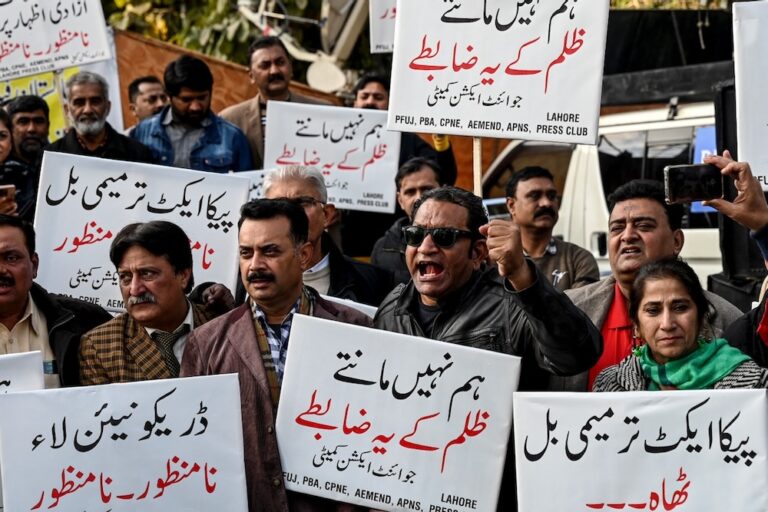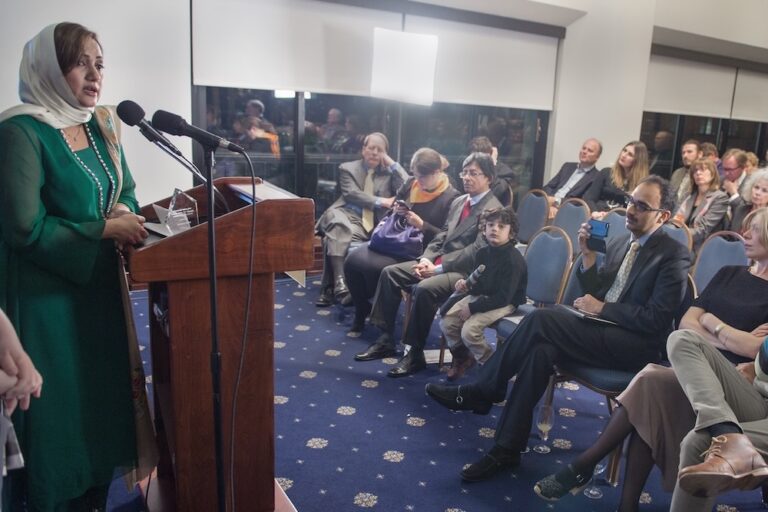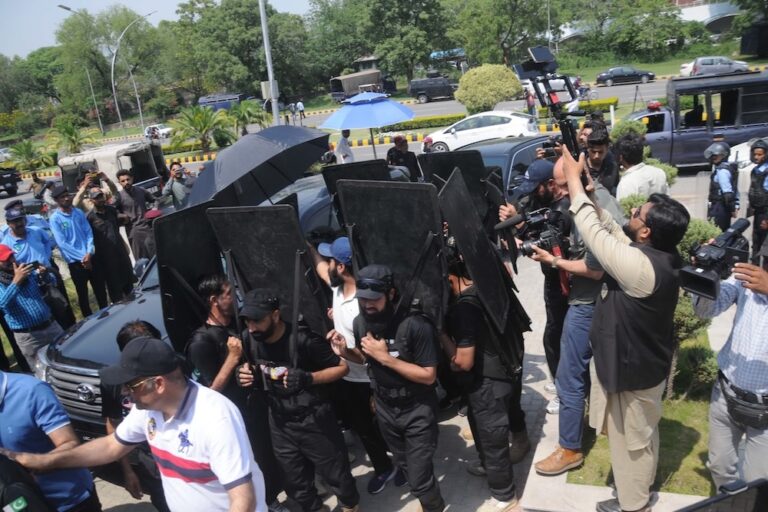(CPJ/IFEX) – CPJ is deeply concerned by the ongoing persecution of Najam Sethi, founding editor of the English-language weekly newspaper “The Friday Times”. **Updates IFEX alerts of 24 June, 23 June, 11 June, 7 June, 2 June, 1 June, 31 May, 26 May, 25 May, 18 May, 12 May, 10 May, 6 May, 5 May […]
(CPJ/IFEX) – CPJ is deeply concerned by the ongoing persecution of Najam
Sethi, founding editor of the English-language weekly newspaper “The Friday
Times”.
**Updates IFEX alerts of 24 June, 23 June, 11 June, 7 June, 2 June, 1 June,
31 May,
26 May, 25 May, 18 May, 12 May, 10 May, 6 May, 5 May and 19 April 1999**
On 15 July 1999, the Chief Election Commissioner (CEC) summoned Sethi to
appear
before the court on 28 July in response to a petition filed by a member of
Pakistan’s National Assembly seeking to disqualify him from ever voting or
running for office. The petition – filed by Syed Zafar Ali Shah, a member of
the ruling party – asks the CEC to determine Sethi’s religious credentials,
and requests that his name be struck from the voters’ lists if he “does not
fulfill the requirements of a Muslim” as defined in Article 260-3 of
Pakistan’s constitution. The petitioner also charges that Sethi’s speech
before a New Delhi audience on 30 April violates Articles 62(h) and 63-1(g)
of the constitution, which prohibit people whose speech or actions are
deemed prejudicial to the “Ideology of Pakistan” from holding any elected
office.
Journalists in Pakistan have told CPJ that the case was filed at the behest
of Senator Saifur Rahman, who heads the government’s Ehtesab
(Accountability) Bureau and is widely believed to be in charge of the
administration’s attacks against those in the political opposition,
including members of the media.
Meanwhile, Sethi and his family are fighting more than two dozen cases of
tax evasion, all of which appear to be politically motivated. Successive
administrations in Pakistan have often exploited the country’s tax code to
punish journalists for publishing news perceived as critical of the
government’s performance. CPJ noted this tendency most recently in the case
of Prime Minister Muhammad Nawaz Sharif’s administration’s pursuit of the
Jang Group of Newspapers. By February of this year, Pakistan’s Income Tax
Department had filed income and wealth tax claims against the company and
its publisher totaling 2 billion rupees (US$40 million); the flurry of tax
notices appeared to be linked to a government-sponsored campaign to suppress
the Jang publications’ coverage of various financial scandals dogging the
administration (see IFEX alerts).
Sethi also has yet to receive written confirmation of his removal from
Pakistan’s Exit Control List (ECL), which prevents him from traveling
abroad.
Sethi’s persecution began earlier this year when he was arrested at his home
in Lahore on 8 May, and detained for nearly a month in the custody of
Pakistan’s Inter-Services Intelligence (ISI) agency, the army’s intelligence
unit. Government statements indicated that Sethi was being investigated for
“anti-state” activities, including his New Delhi speech as well as alleged
collaboration with Indian intelligence operatives. CPJ believes that Sethi
was arrested because his newspaper has often called on Sharif’s government
to answer allegations of high-level corruption, and because he had recently
assisted a BBC television team investigating these same allegations. Though
Sethi was released without charge on 2 June, he faces ongoing harassment.
The latest actions violate assurances made to CPJ on 19 December 1998 by
Ashfaq Ahmad Gondal, Pakistan’s principal information officer for the press
information department. Writing in response to CPJ’s previous letters,
Gondal asserted that “The Government has a clear, consistent, and categoric
policy that ensures promotion, protection, and preservation of the freedom
of press in the country.” Gondal further stated that such a government
“cannot even for a moment consider steps that impinge upon freedom of
expression.” Yet authorities in Pakistan appear to target journalists
routinely for exercising their professional duties.
Recommended Action
Send appeals to the prime minister:
have taken systematic action to deprive Sethi and other Pakistani
journalists of their internationally recognized right to report and publish
freely
press
freedom by ensuring that the country’s legal and administrative machinery –
including electoral regulations, civil and criminal statutes, and tax
codes – are not used to punish journalists for their work
Sethi’s
name from Pakistan’s Exit Control List
Appeals To
His Excellency Muhammad Nawaz Sharif
Prime Minister
Prime Minister’s Secretariat
Islamabad, Pakistan
Fax: +92 51 920 5532
E-mail: primeminister@pak.gov.pk
Please copy appeals to the source if possible.


